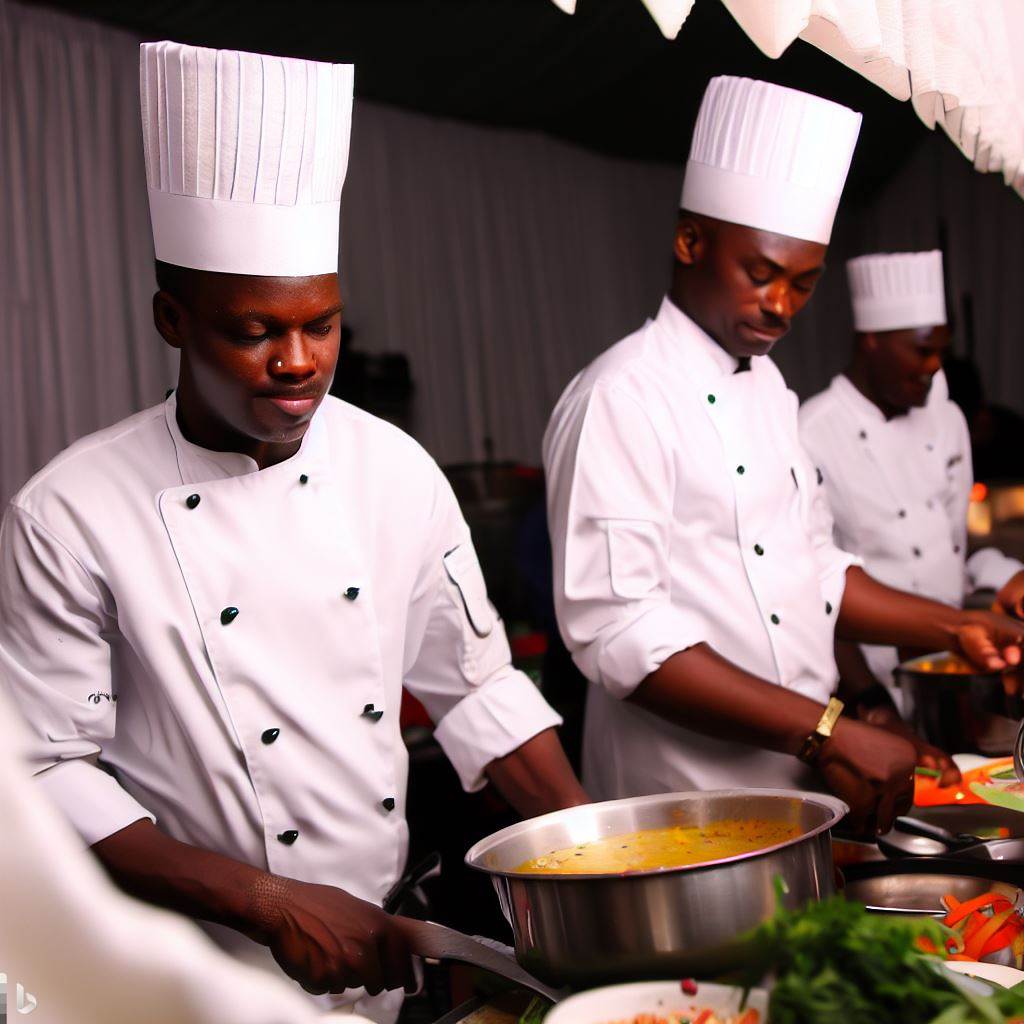Introduction
Within the Nigerian hospitality industry, diversity thrives, spanning a spectrum of accommodations, dining establishments, and tourism services.
However, it’s the unsung heroes, the waiters and waitresses, who wield significant influence within this sector. Their pivotal role revolves around crafting a memorable dining experience for every customer.
To excel in this profession, waiters and waitresses need a skill set that extends beyond taking orders and delivering meals.
They must possess exceptional interpersonal skills, engaging with patrons courteously and attentively.
An understanding of menu offerings, including ingredients and preparation methods, is essential to provide detailed information and recommendations.
Furthermore, time management is crucial for balancing multiple tables efficiently.
Waitstaff must be adept at problem-solving, addressing customer concerns promptly and professionally.
Adaptability to fast-paced environments and the ability to maintain composure under pressure are paramount. Attention to detail ensures accurate orders and billing.
In summary, the Nigerian hospitality landscape encompasses a wide array of services, with waiters and waitresses as linchpins.
Their role hinges on a versatile skill set that combines interpersonal finesse, menu knowledge, time management, problem-solving, and adaptability to create exceptional dining experiences.
Communication Skills
Importance of effective communication in the Nigerian hospitality industry
A. Verbal communication skills necessary for waiters in a Nigerian context
- Clear pronunciation and projection of voice
- Understanding and using local languages and dialects
- Communicating with diverse customers
B. Non-verbal communication skills for waiters in Nigeria
- Body language and facial expressions
- Eye contact and posture
- Gestures and physical proximity
In the Nigerian hospitality industry, effective communication is pivotal for waiters to excel in their roles. Proficient communication enhances customer satisfaction and elevates overall service quality.
Verbal communication stands as a cornerstone in a waiter’s ability to engage with patrons.
Clear pronunciation and adequate voice projection ensure customers understand orders and requests, averting potential misunderstandings.
Understanding and employing local languages and dialects hold particular importance for Nigerian waiters.
Nigeria’s diverse ethnic landscape boasts numerous distinct languages and dialects.
Waiters fluent in these local tongues establish more intimate connections with customers, fostering a sense of belonging and comfort, thereby enhancing the dining experience.
Moreover, adaptability in communication is essential. Catering to a diverse clientele, waiters must tailor their approach to meet varying preferences and expectations.
This flexibility creates a welcoming atmosphere, pleasing a broad customer base.
Non-verbal communication skills are equally vital. Mastering body language and facial expressions helps convey warmth, attentiveness, and professionalism. Positive non-verbal cues make patrons feel valued.
Eye contact and posture further enhance non-verbal communication. Maintaining eye contact displays respect and active listening, while proper posture portrays professionalism and attentiveness.
Lastly, gestures and appropriate proximity aid in communication.
Thoughtful gestures and respectful physical proximity convey messages and assistance effectively, contributing to an overall enjoyable dining experience.
In short, waiters in the Nigerian hospitality sector require strong communication skills to provide exceptional service and ensure customer satisfaction.
Proficient verbal and non-verbal communication, including local language proficiency, adaptability, and positive cues, are essential for creating a pleasant dining experience.
Customer Service Skills
Waiters in the Nigerian hospitality industry must possess essential customer service skills.
Understanding and adapting to Nigerian cultural values and expectations, which emphasize respect, hospitality, and warmth, is paramount.
A. Active listening and empathy for customers
Waiters need to actively listen to customers to understand their needs and preferences better.
This enables them to offer personalized recommendations, enhancing the overall dining experience.
B. Patience and understanding in handling difficult customers
Patience and understanding are crucial when dealing with challenging situations.
Waiters should empathize with customers’ concerns, effectively address issues, and find suitable solutions for customer satisfaction.
C. Ability to anticipate and fulfill customer needs and preferences
Paying attention to details and observing customer preferences allows waiters to proactively recommend menu items or alternatives, creating a personalized dining experience.
D. Conflict resolution skills in a professional manner
Conflict resolution skills are vital for maintaining a positive restaurant atmosphere.
Waiters should handle disagreements diplomatically to ensure customers leave with a positive impression.
In essence, waiters in Nigeria rely on customer service skills.
Understanding cultural values, active listening, empathy, patience, anticipation of needs, and conflict resolution are essential for exceptional service.
These skills contribute to a positive dining experience, customer satisfaction, and loyalty.
Read: Salary Expectations for Waiters in Lagos: A Review
Product Knowledge and Menu Familiarity
A waiter’s proficiency in product knowledge and menu familiarity is crucial to providing exceptional service in a Nigerian restaurant.
This section will delve into the importance of having a thorough understanding of the menu, traditional Nigerian dishes and ingredients, knowledge of food allergies and dietary restrictions, and the ability to make recommendations and provide accurate descriptions.
A. Importance of having a thorough understanding of the menu
- A waiter must possess a comprehensive understanding of the menu to assist customers effectively.
- Knowing the ingredients, cooking techniques, and flavors of each dish enables waiters to answer customers’ inquiries confidently.
- By understanding the menu, waiters can make personalized suggestions based on customers’ preferences.
- A waiter’s ability to navigate the menu knowledgeably enhances the overall dining experience for customers.
- Furthermore, a thorough understanding of the menu fosters trust and credibility with customers.
B. Traditional Nigerian dishes and ingredients
- Waiters should be well-versed in traditional Nigerian cuisine to educate customers who may be unfamiliar.
- Knowing the various regional dishes and their specific ingredients allows waiters to accurately explain them to customers.
- Understanding traditional Nigerian dishes enables waiters to provide valuable insights about cultural traditions and culinary heritage.
- Waiters with knowledge of Nigerian dishes can make recommendations based on customers’ preferences and dietary needs.
- Overall, familiarity with traditional Nigerian dishes enhances the authenticity and quality of the dining experience.
C. Knowledge of food allergies and dietary restrictions
- Awareness of common food allergies and dietary restrictions is essential for waiters to accommodate customers’ needs.
- Waiters should be able to identify potential allergens in dishes, such as nuts, gluten, or dairy, to ensure customer safety.
- Understanding dietary restrictions, such as vegetarian or vegan diets, enables waiters to suggest suitable alternatives.
- By being knowledgeable about food allergies and dietary restrictions, waiters can provide a comfortable dining experience for everyone.
- Proper communication and consideration of dietary needs build customer loyalty and satisfaction.
D. Ability to make recommendations and provide accurate descriptions
- Waiters must possess the ability to make informed recommendations based on customers’ preferences and dietary requirements.
- Beyond recommending dishes, waiters should provide accurate descriptions of each menu item’s taste, texture, and presentation.
- Providing accurate descriptions helps customers make well-informed decisions, leading to a more satisfying dining experience.
- Waiters should be able to suggest suitable wine or beverage pairings to complement customers’ chosen dishes.
- The skill of making recommendations and providing accurate descriptions enhances customer trust and loyalty.
In general, a waiter’s proficiency in product knowledge and menu familiarity plays a vital role in delivering excellent service in a Nigerian restaurant.
Understanding the menu, traditional Nigerian dishes, food allergies, dietary restrictions, and the ability to make recommendations and provide accurate descriptions all contribute to an exceptional dining experience.
By investing in staff training and emphasizing the importance of product knowledge, Nigerian restaurants can elevate their service and create memorable experiences for their customers.
Read: Nigerian Cuisine: What Every Chef Needs to Know

Efficiency and Time Management Skills
Efficiency and time management skills are crucial for waiters in the Nigerian hospitality industry.
The fast-paced nature of the industry demands employees who can work quickly and effectively to provide excellent customer service.
Here are some key aspects of efficiency and time management skills that waiters must possess:
A. Fast-paced nature of the Nigerian hospitality industry
The Nigerian hospitality industry is known for its fast-paced environment, with customers expecting efficient and timely service.
Waiters must be able to keep up with the demands of the industry and work at a rapid pace to meet customer expectations.
B. Ability to multitask and handle multiple tables simultaneously
Waiters often have to handle multiple tables at once, especially during peak hours.
They must possess the ability to multitask effectively, ensuring that each customer receives prompt attention and service.
Whether it’s taking orders, serving food and drinks, or addressing customer inquiries, waiters must be able to handle multiple tasks simultaneously without compromising the quality of service.
C. Organizational skills to prioritize tasks and ensure timely service
Organizational skills are essential for waiters to prioritize their tasks and provide timely service. They need to assess each customer’s needs and prioritize their actions accordingly.
From taking and delivering orders to checking on the status of food preparation, waiters must efficiently manage their time and ensure that each task is completed in a timely manner.
D. Quick decision-making in high-pressure situations
In highly demanding situations, such as during peak hours or when dealing with difficult customers, waiters must make quick decisions to maintain the smooth flow of operations.
They need to think on their feet, resolve issues promptly, and remain calm under pressure. Quick decision-making is crucial to ensure efficient service delivery and customer satisfaction.
To summarize, efficiency and time management skills are essential for waiters in the Nigerian hospitality industry.
The ability to work in a fast-paced environment, multitask effectively, prioritize tasks, and make quick decisions is paramount to providing excellent customer service.
Waiters who possess these skills are more likely to excel in their roles and contribute to the success of the establishments they work for.
Read: Waitress Training in Nigeria: Top Schools & Costs
Attention to Detail
A. Quality and Presentation Standards in Nigerian Restaurants
In Nigerian restaurants, waiters must have a keen eye for quality and presentation standards.
They should ensure that the food looks appetizing and is served in an aesthetically pleasing manner.
Waiters should pay attention to the little details that make a difference in the overall dining experience.
B. Checking Orders for Accuracy Before Serving
One crucial skill for waiters in Nigeria is the ability to check orders for accuracy before serving them.
They must ensure that the right dishes are prepared and plated according to the customer’s request.
Mistakes can lead to customer dissatisfaction, so being meticulous in this aspect is vital.
C. Noticing Customer Preferences and Special Requests
Waiters should have the ability to notice customer preferences and address special requests promptly.
Whether it’s avoiding certain ingredients or accommodating dietary restrictions, attention to detail is crucial.
Remembering personal preferences helps provide a personalized and satisfactory dining experience.
D. Maintaining Cleanliness and Neat Appearance
In Nigerian restaurants, waiters must maintain cleanliness and a neat appearance throughout their shifts.
They must ensure that tables are clean, cutlery is polished, and the overall dining area is presentable.
Appearance matters as customers perceive cleanliness and professionalism based on waiters’ appearance.
Attention to detail is an essential skill for waiters in Nigerian restaurants.
Here are some reasons why:
- Enhanced Quality and Presentation: By paying attention to detail, waiters can ensure that the food prepared meets quality standards and is presented well. This enhances the overall dining experience.
- Customer Satisfaction: By checking orders for accuracy, waiters can avoid mistakes and ensure that customers receive what they ordered. This increases customer satisfaction and reduces the chances of negative reviews or complaints.
- Personalized Service: Noticing customer preferences and special requests allows waiters to provide personalized service. This makes customers feel valued and enhances their dining experience.
- Professionalism: Maintaining cleanliness and a neat appearance reflects professionalism. When waiters pay attention to detail in their appearance, customers perceive them as more professional and trustworthy.
Basically, attention to detail is a crucial skill for waiters in Nigerian restaurants.
From maintaining quality and presentation standards to checking orders for accuracy and addressing customer preferences, waiters must pay attention to the small details that can make a significant difference.
Additionally, maintaining cleanliness and a neat appearance reinforces professionalism.
By honing this skill, waiters can provide an exceptional dining experience for their customers.
Read: Culinary Trends in Nigeria: A Chef’s Perspective
Teamwork and Collaboration
A. Importance of working as a team in a restaurant setting
Working as a team is crucial for waiters in a restaurant setting. It ensures efficient service delivery and overall customer satisfaction.
When waiters collaborate effectively, they are able to streamline tasks, share responsibilities, and provide a pleasant dining experience for customers.
By working together, waiters can enhance their productivity and efficiency. They can divide tasks among themselves, such as taking orders, serving food, refilling drinks, and clearing tables.
This division of labor allows each waiter to focus on their assigned responsibilities, resulting in faster service and reduced waiting time for customers.
Additionally, teamwork enables waiters to support each other during busy periods.
When the restaurant is crowded, waiters can help out their colleagues by sharing tables or taking over each other’s tasks.
This ensures that no customer is left unattended and prevents any delays in service.
B. Coordination with kitchen staff and other waitstaff
Another aspect of teamwork for waiters is coordinating effectively with kitchen staff and other waitstaff.
Waiters must communicate customer orders accurately to the kitchen and ensure that any special requests or dietary restrictions are properly conveyed.
In a Nigerian restaurant, waiters often work closely with kitchen staff to ensure that orders are prepared correctly and delivered timely.
By establishing a good rapport with the kitchen staff, waiters can ensure that the food is served hot and presented well, meeting the expectations of the customers.
Waiters should also collaborate with other waitstaff to provide a seamless dining experience.
They can coordinate table assignments, share information about specific customer preferences, and assist each other during busy periods.
This cooperation among the waitstaff helps in maintaining the restaurant’s reputation for excellent customer service.
C. Assisting colleagues when needed
In a Nigerian restaurant, waiters are expected to assist their colleagues when needed.
This can include helping with large orders, especially during events or special occasions, where multiple tables may request similar dishes at the same time.
If a fellow waiter is overwhelmed with their workload, it is important for other waiters to step in and offer assistance.
By doing so, they can ensure that all customers receive prompt service and that the workload is evenly distributed among the waitstaff.
Assisting colleagues also extends to sharing tables.
If a waiter’s section is full and another section has vacant tables, waiters can collaborate by seating customers in the available section to accommodate everyone efficiently.
D. Effective communication within the team for smooth operations
Effective communication within the team is essential for waiters to ensure smooth operations in a restaurant.
By maintaining clear and timely communication, waiters can provide better service to customers and resolve any issues that may arise.
Waiters should promptly relay customer requests, whether it is a special dietary requirement, a complaint, or a specific preference.
Clear communication with the kitchen staff is also vital to ensure that the food is prepared and served according to the customer’s specifications.
Furthermore, waiters should share important information with their team members.
This can include updates on menu changes, availability of certain dishes or ingredients, or any company policies that may affect the service delivery.
In addition, effective communication allows waiters to address any issues that may arise during the shift.
They can discuss and resolve problems together, ensuring that customers are satisfied and that the restaurant maintains a positive reputation.
In fact, teamwork and collaboration are essential skills for waiters in a Nigerian restaurant setting.
By working together, waiters can provide efficient service, support each other during busy periods, and create a pleasant dining experience for customers.
Effective communication and coordination further contribute to smooth operations and overall customer satisfaction.
Gain More Insights: Job Opportunities: Finding Plumbing Work in Nigeria’s Cities
Conclusion
To recap, the essential skills required for waiters in Nigeria include excellent communication and interpersonal skills, the ability to multitask and work under pressure, good memory and attention to detail, and a positive and friendly attitude.
These skills are of utmost significance for successful restaurant service as they directly impact customer satisfaction, repeat business, and the overall reputation of the establishment.
It is important to encourage aspiring waiters to continuously develop and improve these skills through training programs, seminars, and mentorship.
This will ensure that the Nigerian hospitality industry thrives and maintains high standards of customer service.
In the end, being a waiter in Nigeria requires a unique set of skills that go beyond serving food and drinks.
Waiters must possess excellent communication and interpersonal skills, the ability to multitask under pressure, good memory and attention to detail, as well as a positive and friendly attitude.
These skills are crucial for providing exceptional restaurant service that will lead to customer satisfaction, repeat business, and a positive reputation for the establishment.
Aspiring waiters should continuously work on developing and improving these skills through training and mentorship programs to contribute to the growth of the Nigerian hospitality industry.




